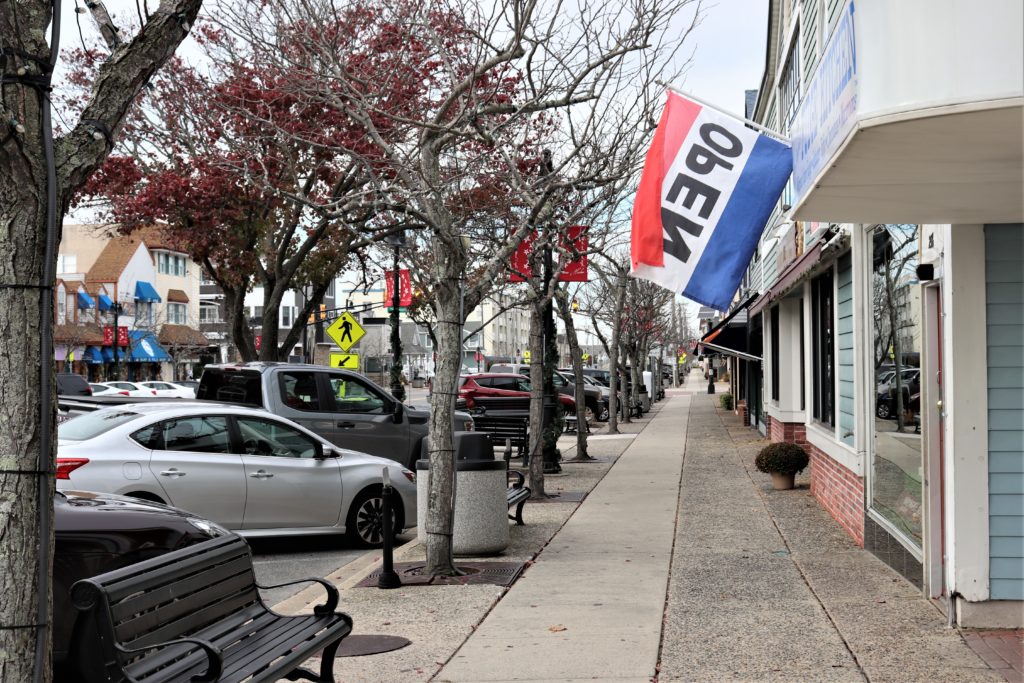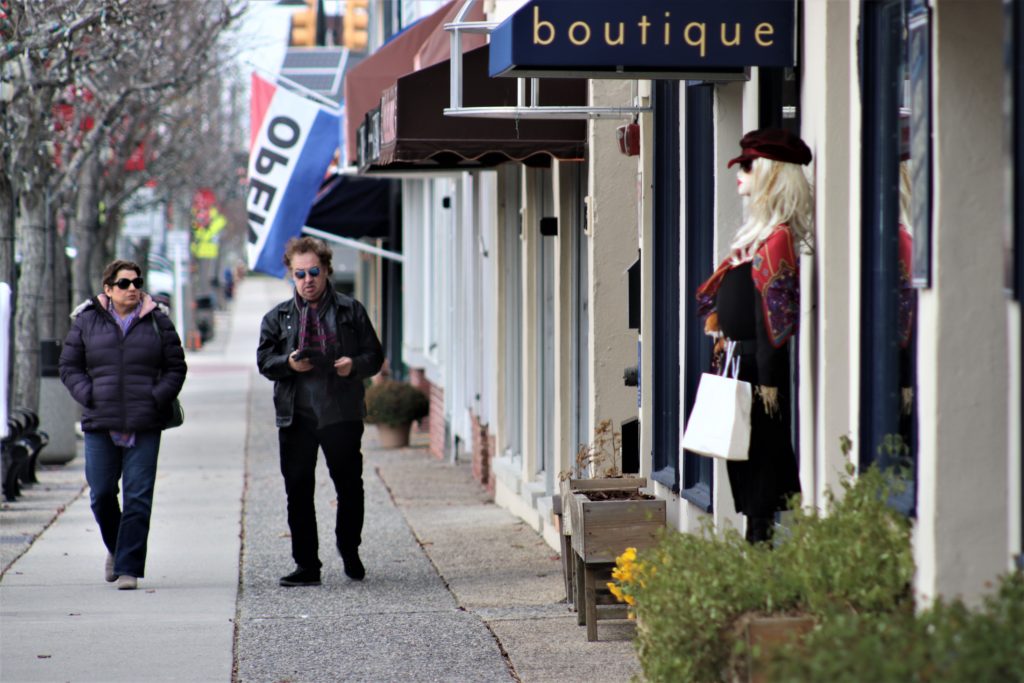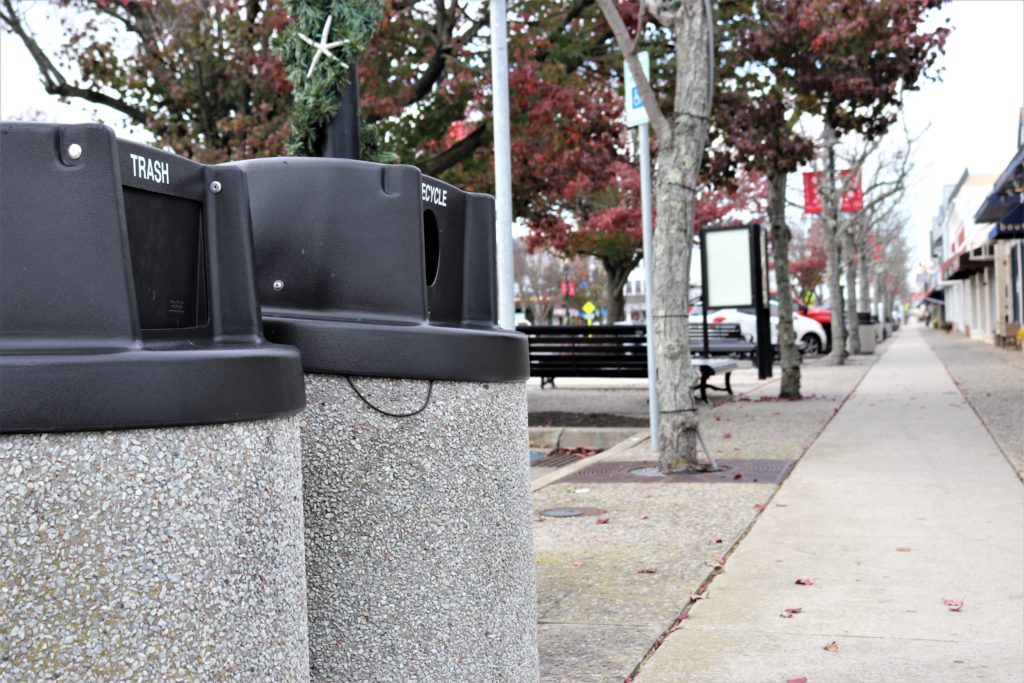
It’s quiet along 96th Street, in Stone Harbor, during the lull between the summer crowds and holiday shopping. On a breezy November weekday, a borough crew decorated the entrance to town, and several stores were open for the few shoppers strolling.
Over the summer, here, and in neighboring Avalon, an ordinance took effect, preventing businesses from handing out plastic bags or straws, or using takeout containers that are not biodegradable or recyclable. The idea is to keep the material out of landfills, and out of the surrounding environment.
Opponents of bag bans say they hurt businesses, pointing to 18,000 jobs in plastic manufacturing in the state, and say that moving to other materials would drive up costs for consumers.
At least in Stone Harbor, that did not seem to be much of a worry.
In several shops, the reaction to an ordinance banning single-use plastic bags was similar – more a bemused shrug than a complaint.
In Fred’s Tavern, a bartender pointed out a stack of biodegradable straws. The paper kind tended to dissolve in the drinks, but these work fine, he said, and seem indistinguishable from plastic.
At Global Pursuits, a clothing store, the owners did away with plastic bags years before the ban, according to longtime employee Susie Bickford, so nothing changed when the ordinance went into effect.
Once in a while, she said, a customer asks for a plastic bag, either on a rainy day or because they are riding a bike, but for the most part, customers are happy to get a paper bag.
The ordinance, approved in the spring, also bans polystyrene takeout containers, single-use plastic cup lids, and other plastic items. It’s almost identical to one approved in Avalon, putting the resort communities on Seven Mile Beach at the forefront of a conversation happening throughout New Jersey, across the country, and around the world.

Oceans of Plastic, Marshes Full of Bags
Federal statistics state that American consumers use more than 380 billion plastic bags, sacks, and wraps each year. The too-familiar, thin, double-handled grocery bag makes up about 100 billion of those annually, according to data compiled by the Wall Street Journal.
The bags can be recycled, but rarely are. They clog the machinery at single-stream facilities, where staff gather them into bales, like hay.
Supermarkets have bins to deposit the bags, which can be recycled into new bags, but only a fraction of those distributed make the return trip. Most end up in landfills.
According to the website Conserving Now, most people use a plastic carrier bag for 12 minutes, and about one in every 200 ends up getting recycled.
Consumers had little access to plastic before World War II. The grocery bag went from its introduction in the 1960s, to widespread distribution in the 1980s, to near ubiquity today.
In Stone Harbor and Avalon, the major concern was not those ending up in the landfill, but those that don’t, blowing across the marshes or into the ocean.
The issue is obvious to anyone walking along the beach, according to Lenore Tedesco, executive director, The Wetlands Institute.
“It came up initially as a marine debris issue,” she said, in a recent interview. The argument plays well in the barrier island communities, where homeowners and residents see plastic bags and plastic foam cups in the back bays and open water.
“We’re an ocean community, and we care about our wildlife,” Tedesco said.
Environmental Motivation
Keeping plastics out of the environment was the main impetus for Avalon’s ordinance, according to Scott Wahl, Avalon’s administrator. He described Tedesco as invaluable in the process, helping both island communities craft their ordinances.
Environmental issues sold Wahl on the proposal, he said, citing images of sea-life tangled in monofilament or six-pack rings, or choked on plastic bags.
“That turned my thinking around,” he said.
The ordinances are almost identical between Avalon and Stone Harbor, he said. Avalon worked closely with merchants while crafting the ordinance, as well as on the timing for enacting it. The borough allowed merchants to finish their current stock of bags and containers, in part because it seemed more reasonable, but also because it made no sense to ask them to throw the plastic items out to reduce the amount of waste entering landfills.
According to Wahl, the municipality spoke with merchants at length before enacting the ordinance and continues to work with business owners. If an item can be recycled in Cape May County, he said, it can be used.
One repeated question from homeowners Wahl receives is whether they can bring bags into town. That is not an issue, he said.
There were also questions about the plastic bags used to protect newspapers delivered to front sidewalks. According to Wahl, after extensive consideration, the ruling was that because the papers were bagged off the island, they would not fall under the ordinance.
The results have been positive, he said.
“It really raised a dialogue among the merchants seeking the best alternatives. Some merchants made the transition before the ordinance went into effect,” he said. “It’s keeping plastic out of the waste stream, and also out of the waterways.”

Few Issues Reported
Stone Harbor merchants like the idea of helping the environment, according to Marnie Lengle, the coordinator of the Stone Harbor Chamber of Commerce.
There is an additional cost to businesses, she said, but members of her organization agree with the goal of reducing plastic use. Their customers have also responded well, she added, but there are a few complaints.
For one, the merchants would have preferred to see the change phased in over time. She said borough officials gave some notice before the change took effect, but there have been issues with setting up supply chains. A local supplier that most stores relied on has not stocked renewable products, forcing business owners to look to larger chains out of the area.
Another issue raised by some business owners, who did not want to be named, related to compostable items. The ordinance allows compostable items, such as coffee cup lids or disposable forks, but the Cape May County Municipal Utilities Authority (CMCMUA) does not have a composting facility.
If the items end up in the recycling container, they are considered contamination. Add enough of the compostable items, which may seem identical to traditional plastic to most consumers, and the entire container of recyclable material ends up in the landfill.
Attempts to contact the CMCMUA’s recycling coordinator were unsuccessful.
This is not an easy issue, Tedesco acknowledged. Recycling is getting increasingly difficult, she said, with international markets for the raw material closing their doors.
“It’s getting harder and harder to recycle anything. There just isn’t a market right now,” she said.
Meanwhile, massive amounts of plastic products continue to be produced.
If the towns waited for everything to be perfect for a plastic bag ban, the ordinance would never move forward, Tedesco argued. Manufacturers may begin to compete for renewable and compostable materials, she said, but there first needs to be a market for them.
Ideally, she said, composting should be readily available, but without it, the ordinances are a step in the right direction.
“Even if it ends up in a landfill, it still started as a better product that will eventually break down,” she said.
There is little chance plastics will go away anytime soon, Tedesco said. The various forms are far too useful in too many fields, but single-use items like straws, plastic bags, and takeout containers have gotten out of control. She said it may be a little less convenient to bring a reusable cloth bag or a steel straw when you need one, but it does not take long to change the habit.
What’s more, she said, most plastics are made from petroleum, and their manufacture is eating up any savings in oil use from increased efficiency and renewable energy.
“More than half of the plastics in the world have been made in the last 15 years. This is not sustainable,” she said.
She argues that the nation is behind the rest of the world on disposable plastics. This year, New York joined Hawaii and California in banning most single-use grocery store bags, with the law set to take effect next spring.
Nations from Kenya to the Netherlands, and Albania to New Zealand, have approved bag bans, starting with Bangladesh in 2002.
Other Towns Talking, but No Action So Far
While the Wetlands Institute supports plastic container and bag bans, Tedesco said she is not lobbying other towns to consider them. She said Avalon and Stone Harbor came to her for advice, as have other towns, including Cape May and Middle Township. An ordinance was under consideration, but there’s no vote planned on the near horizon, according to Middle Township officials.
In Cape May, City Council had an ordinance on the agenda Nov. 18, which would restrict the use of plastic foam packages for take-out food and other non-recyclable plastics in the city. Here, too, officials cited the impact on marine life and the environment in taking up the proposal.
However, the ordinance introduction was put off after some residents raised concerns, according to Mayor Clarence Lear. Officials would take a closer look and likely bring the ordinance back, he said.
The Cape May proposal is similar to Stone Harbor’s, Lear said, but it came about after a presentation from local restaurant owner Jonathon Hirsch.
In Ocean City, the Environmental Commission has spearheaded awareness campaigns about plastic bags and balloon releases. A statement from the commission estimates 8.8 million tons of plastic end up in the ocean each year.
There has not been a formal vote by Ocean City Council on the issue, according to city spokesman Doug Bergen.
Some of the drive eased off this year, when it appeared Gov. Phil Murphy would push for a statewide ban. Last year, Murphy vetoed a move that would have charged consumers a nickel for each disposable bag.
According to Tedesco, an additional charge has a minimal effect on the number of bags used. For now, statewide action appears stalled, with some advocates turning to local communities.

Not Everyone Backs Bans
Writing for the conservative publication The National Review this year, Katherine Timpf argued that a ban on plastic bags in New Jersey would not have the impact supporters expect.
She, and others, say most of the giveaway shopping bags are recycled, even if they do not find their way to the disposal bin at the supermarket, used for cat litter and garbage bags. She cited statistics indicating the sale of small, plastic bags skyrocketed in California, after that state’s ban took effect.
The disposable bags are cheap. One report puts the number between 2 to 5 cents per bag, with paper bags costing 5 to 23 cents. On Amazon, a bundle of 1,000 supermarket-style bags sells for $24.99, with many of the customers leaving comments, saying they live in California or another state that has banned bags.
Bag the Ban, an advocacy group, argues that bag bans do not meaningfully reduce litter, and that plastic bags use far less energy to produce than other options.
The group, which represents the U.S. plastic bag manufacturing and recycling industry, also says the bags are made from byproducts of natural gas, not petroleum.
To contact Bill Barlow, email bbarlow@cmcherald.com.
Since this story posted, NJ.com has reported a Senate bill to ban single-use plastic bags and plastic foam containers come come up for a vote. See the story here.
This story was produced in collaboration with the New Jersey Sustainability Reporting Hub project. It was originally reported by Bill Barlow for the Cape May County Herald, and may be re-distributed through the Creative Commons License, with attribution.
